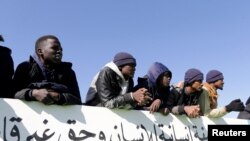Walid Alorafi, spokesman for the Criminal Investigation Department (CID) in Benghazi, said according to some migrants, they were held in captivity for up to seven months and "they wanted to go to Europe."
The migrants are from a variety of sub-Saharan countries but mainly from Somalia, Alorafi said.
"We raided a hideout in the downtown of Kufra last night and we found illegal migrants including women, children and old men who some have marks of torture and bullets," Alorafi said.
"The migrants have been all handed over to (the) illegal migration agency for completion of some procedures," Alorafi added.
CID posted video footage of their force demolishing the house where the migrants were held. Other footage included shots of migrants with torture marks on their bodies. Some migrants were seen being carried toward an ambulance by aid workers. Some migrants' "health condition is very poor," Alorafi said.
Kufra is about 1,712 kilometers (1,064 miles) from the capital Tripoli.
Libya has become a transit route for migrants fleeing conflict and poverty to Europe via the dangerous route across the desert and over the Mediterranean following the toppling of Muammar Gaddafi in a NATO-backed uprising in 2011. Its oil-based economy is also a draw for migrants seeking work.
Oil-rich Libya is home to 704,369 migrants from over 43 nationalities, according to data collected in 100 Libyan municipalities in mid-2023, U.N. figures show. In March, the International Organization for Migration said at least 65 migrants' bodies had been discovered in a mass grave in southwest Libya by CID.
"I urge bolstered regional cooperation to ensure migrants' protection," said the U.N. special envoy Abdullah Bathily in his briefing to the Security Council in April.
Bathily, who had tendered his resignation to U.N. Secretary-General Antonio Guterres, said "recent reports from Sabha revealed shocking treatment of migrants in arbitrary detention, underscoring the urgent need for action by Libyan authorities to ease human suffering."










Forum